Crackpot, Problem Child, Great Fighting Leader

One of these things is not like the others:
Crackpot. Problem Child. Great Fighting Leader.
Or is it?
What does a leader look like?
Eisenhower called Patton a “crackpot” and a “problem child” and a “great fighting leader in pursuit and exploitation.” (See letter below from General Eisenhower to General Marshall.)
“Old Blood and Guts” Patton was like many of history’s great warriors. He came with flaws—and those working with him had to decide if they could accept him, warts and all.
President Franklin D. Roosevelt’s response after being asked about Patton during a press conference:
I think probably that you may, if you want to write a piece, stick in there the story of a former president (Lincoln) who had a good deal of trouble in finding a successful commander for the armies of the United States.
And one of them turned up one day, and he was very successful.And some very good citizens went to the president and protested: “You can’t keep him. He drinks.”
“It must be a good brand of liquor,” was the answer.
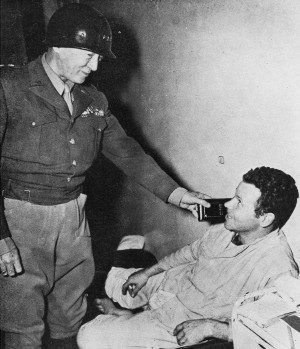
LTG George S. Patton visiting wounded soldier in hospital.
He scared people during battle, just as much as he scared some during public appearances, with a microphone in front of him. No one knew what he was going to say or do.
He was admired.
General Eisenhower, after Patton’s death:
He was one of those men born to be a soldier, an ideal combat leader…It is no exaggeration to say that Patton’s name struck terror at the hearts of the enemy.
And he was disliked.
President Harry Truman:
[I] don’t see how a country can produce such men as Robert E. Lee, John J. Pershing, Eisenhower, and Bradley and at the same time produce Custers, Pattons, and MacArthurs.
He was a born warrior—and wanted to be in battle.
I love war and responsibility and excitement. Peace is going to be hell on me. I will probably be a great nuisance.
He was raw.
War is bloody, killing business. You’ve got to spill their blood, or they will spill yours! Rip them up the belly. Shoot them in the guts. When shells are hitting all around you and you wipe the dirt off your face and realize that instead of dirt it’s the blood and guts of what once was your best friend beside you, you’ll know what to do!
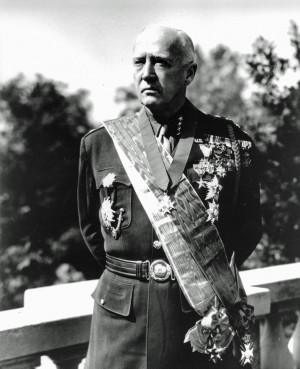
George S. Patton with medals at Lake Vineyard, June 1945.
He was undiplomatic.
The more I see of people, the more I regret that I survived the war.
He was honest.
Every man is scared in his first battle. If he says he’s not, he’s a liar. Some men are cowards but they fight the same as the brave men or they get the hell slammed out of them watching men fight who are just as scared as they are. The real hero is the man who fights even though he is scared. Some men get over their fright in a minute under fire. For some, it takes an hour. For some, it takes days. But a real man will never let his fear of death overpower his honor, his sense of duty to his country, and his innate manhood. Battle is the most magnificent competition in which a human being can indulge. It brings out all that is best and it removes all that is base.
He was thoughtful.
Through a Glass, Darkly
by General George S. Patton, Jr.
Through the travail of the ages,
Midst the pomp and toil of war,
I have fought and strove and perished
Countless times upon this star.
In the form of many people
In all panoplies of time
Have I seen the luring vision
Of the Victory Maid, sublime.
I have battled for fresh mammoth,
I have warred for pastures new,
I have listed to the whispers
When the race trek instinct grew.
I have known the call to battle
In each changeless changing shape
From the high souled voice of conscience
To the beastly lust for rape.
I have sinned and I have suffered,
Played the hero and the knave;
Fought for belly, shame, or country,
And for each have found a grave.
I cannot name my battles
For the visions are not clear,
Yet, I see the twisted faces
And I feel the rending spear.
Perhaps I stabbed our Savior
In His sacred helpless side.
Yet, I’ve called His name in blessing
When after times I died.
In the dimness of the shadows
Where we hairy heathens warred,
I can taste in thought the lifeblood;
We used teeth before the sword.
While in later clearer vision
I can sense the coppery sweat,
Feel the pikes grow wet and slippery
When our Phalanx, Cyrus met.
Hear the rattle of the harness
Where the Persian darts bounced clear,
See their chariots wheel in panic
From the Hoplite’s leveled spear.
See the goal grow monthly longer,
Reaching for the walls of Tyre.
Hear the crash of tons of granite,
Smell the quenchless eastern fire.
Still more clearly as a Roman,
Can I see the Legion close,
As our third rank moved in forward
And the short sword found our foes.
Once again I feel the anguish
Of that blistering treeless plain
When the Parthian showered death bolts,
And our discipline was in vain.
I remember all the suffering
Of those arrows in my neck.
Yet, I stabbed a grinning savage
As I died upon my back.
Once again I smell the heat sparks
When my Flemish plate gave way
And the lance ripped through my entrails
As on Crecy’s field I lay.
In the windless, blinding stillness
Of the glittering tropic sea
I can see the bubbles rising
Where we set the captives free.
Midst the spume of half a tempest
I have heard the bulwarks go
When the crashing, point blank round shot
Sent destruction to our foe.
I have fought with gun and cutlass
On the red and slippery deck
With all Hell aflame within me
And a rope around my neck.
And still later as a General
Have I galloped with Murat
When we laughed at death and numbers
Trusting in the Emperor’s Star.
Till at last our star faded,
And we shouted to our doom
Where the sunken road of Ohein
Closed us in it’s quivering gloom.
So but now with Tanks a’clatter
Have I waddled on the foe
Belching death at twenty paces,
By the star shell’s ghastly glow.
So as through a glass, and darkly
The age long strife I see
Where I fought in many guises,
Many names, but always me.
And I see not in my blindness
What the objects were I wrought,
But as God rules o’er our bickerings
It was through His will I fought.
So forever in the future,
Shall I battle as of yore,
Dying to be born a fighter,
But to die again, once more.
He was a crackpot. He was a problem child. He was a great fighting leader.
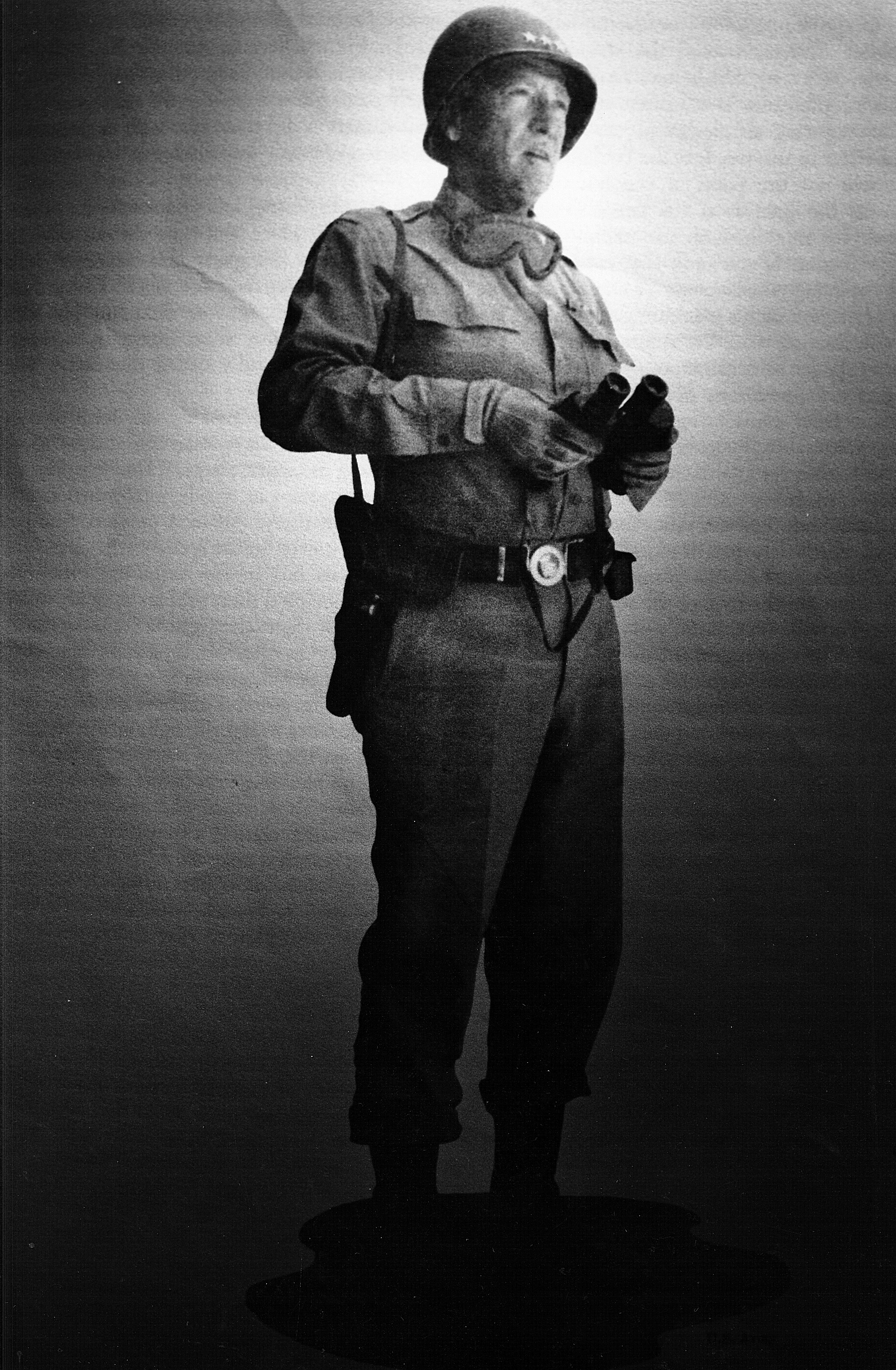
LTG George S. Patton. Credit: General George S. Patton Jr. Collection.
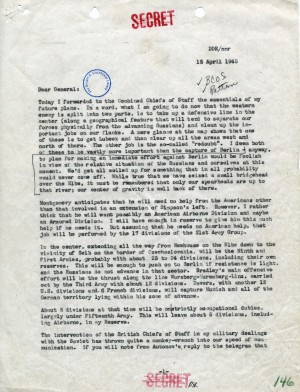
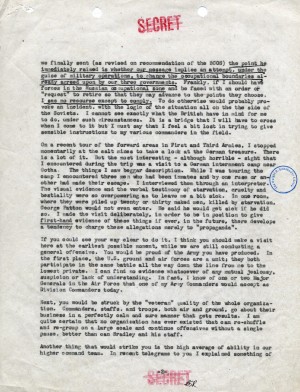
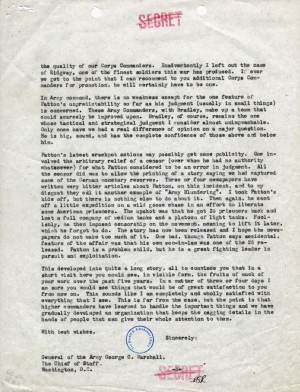




Funny you should post this. I was sorting out my military history books and remembered I finished Carlos D’Este’s Churchill bio “Warlord” but couldn’t do the same with his Patton one. George came off as such a gifted, but self-centered twerp, I put it down.
Perhaps it’s time to pick it up again.
Thanks.
Patton’s interesting. The more I researched, the more I wanted to dig deeper, to find more.
If you are interested in learning more about Patton, may I recommend a couple of books that would give a more insightful and truthful picture of extraordinary man and warrior.
“Before the Colors Fade: Portrait of a Soldier”
by Fredrick Ayers, Jr
How about one from the man’s own mind:
“War As I knew It: George S. Patton’s War Memoirs”
There is also “The Patton Papers” his diaries from the 1880’s to 1945 — these are divided in two vol.
If you do, it would be great to see another “War Story” on him from you!
Thanks for your comments and I second your book suggestions, Tina. His diary, in particular, is a must-read. The portions of his diary that I accessed proved to be incredibly valuable. Rare to have such an opportunity to read what such leaders are thinking/feeling.
I would like to revisit Patton again in the future. Impossible to fit everything in one post.
Three things about Patton:
1. In the “History vs. Hollywood” episode on the Patton movie, Chet Hanson, Bradley’s aide, said George C. Scott nailed the performance of GSP.
2. Patton did -three- plebe years (one at VMI and two at WP) on his way to a commission. That is a heck of a lot of hazing and BS. And in his second plebe year at WP, he had to endure BS from some of his former 4th class cadets. It shows great determination and drive by Patton. Of course no one ever said he lacked those things.
3. When Patton had 3rd Army driving accross France in August, 1944 he used his mechanzied cavalry groups and 19th Tactical Air Command to screen his southern flank. No other Allied general would -ever-have tried that.
Walt
There is a great anecdote in the D’este book. In the 1930’s Patton was offered the chance to be military attache at the Court of Saint James. His wife was all for it. Patton demured.
In a letter to his wife he wrote to the effect that Englishmen were the most suave and smooth customers going. They oozed charm. But they treated their women like crap. It was all for the boys with the Brits, nothing for the girls. Plus, he said, they were always needing money for new horses or the grouse moor or whatever.
Having two teenage daughters, it would just not be good to take that posting. And he further wrote to Bea: “You can tell the girls that some time, and maybe they won’t think I am such an old bastard after all.”
Walt
Thanks for sharing this story and for your first comment. Patton did a lot of amazing things, but many were sidetracked by his sometimes-not-as-wonderful actions. The latter can’t be ignored, but it is a shame when more weight is placed on the latter than on the former.
The “Patton” movie came out when I was thirteen. I was obsessed with the guy for years. 🙂
Walt
Thanks for the post, Mr. Pressfield. I know you weren’t going after Ike, but this does remind me how much I disdain officers like him. Patton was the right man for the job and a lot of individuals who spent too much time inside couldn’t handle the way he was: a pure warrior-officer.
On a side note, General James Mattis is a modern Patton. There I said it.
“In the wake of the [May 15, 1944] conference, Patton made a record of his expectations. He marked on his map the places where he thought the
Third Army would have to fight. He had done the same thing before going to Sicily and was
correct. The historic map is extant, an enduring document of Patton’s prophetic streak. Events confirmed his expectations, as well as his
misgivings.”
–“Patton, Ordeal and Triumph” p. 459, by Ladislas Farago
By D plus 98, Patton’s forces stood on the line forecast to be taken
by D plus 350.
And recall that Patton’s army was not committed until about D plus 55. It is true that by that time the Germans were running like Hell.
After the May 15, 1944 conference Patton was disdainful of Montgomery’s statement that he might go “knocking about down by Falaise” on or right after D-Day.
Patton said it would never happen, and of course Montgomery proved again that he was way too timid for modern war.
Walt
I’m not implying he wasn’t an exceptional combat soldier and dedicated leader with uncanny prescience.
Just that I found something oddly endearing about Churchill’s foibles, while the first half of D’Este’s book painted him as a such self-absorbed ass I put it down.
Just because a book as been published does not make what the writer writes pure and true. One must look to who the writer is and their motivation before one can let their mind absorb the contents of the book.
Yes, I get that, Tina. Carlos D’Este’s presentation wasn’t slanderous. It was the preponderance of evidence that tipped the scales.
Thanks for the input.
Thanks for sharing, Callie! I never knew Patton was such a poet. As someone still searching, I envy that he knew so through and through who and what he was.
Convo between Ike and Patton:
“Every time I get promoted, I get attacked!”
“And every time you get attacked, I bail you out.”
Callie, I know virtually nothing about military history, but I really enjoyed reading this. I love to get a glimpse of real people from long ago outside of what you’d read in a history book – with all their messiness and imperfections intact. Thanks for posting!
Let me suggest another book and another side to the Patton story. The book is Edgar Puryear’s 19 Stars, a comparative biography of MacArthur, Marshall, Eisenhower and Patton. Puryear has a new book out covering some of the same ground, but I haven’t read that one yet.
What’s often forgotten is how disciplined Patton was in things he deemed important. The Puryear book has a marvelous picture of Patton and Eisenhower spending their Sunday afternoons taking apart a tank and putting it back together and challenging each other on tactical exercises.
I really loved this. It has been very informative and useful. Ill come back to check on future articles.
Patton was an artist at heart. His art, simply, was war. Thank God he was on our side.
Crackpot? Primitive? Self-centered twerp? Only good for combat? Self-absorbed ass? Who says so?
A man who can lead 300,000 men to victory in a desperate struggle while putting up with the carping, poor judgement and jealously of Eisenhower, Bradley, Marshal, Montgomery and Roosevelt is not well described by the above epithets. In fact, any man so described could not lead a squad.
The “great” Eisenhower (Roosevelt’s mouthpiece in London when he wasn’t on the golf course) never led troops at all. He opted out in WWI by teaching PT at Fort Benning. Nor did Bradley lead troops. During the great World War he accepted the duty of guarding copper mines in Montana. Marshal’s first, and only, experience in military leadership consisted of destroying the Illinois National Guard between WWI and WWII. Roosevelt believed that “Uncle Joe” Stalin was a friendly Communist and America’s ally. “Monty” caused a mutiny in his command by taking cigarettes away from combat soldiers in the middle of battle.
It was mostly the ability, valor, constancy and honor of Patton and MacArthur that were the deciding factors in the victories in Europe, Africa and the Pacific. And both men understood exactly what a communist was. But what would a little jumped-up haberdasher (Truman) know about that?
MacArthur prevented a Communist takeover of Japan after the war. Patton, two weeks before his death (murder?), told an FBI agent that he was going to resign his commission and tell the American people why they had just fought WWII: To make the world safe for the Communists.
In fact both men were highly evolved, rather elegant men with a deep understanding of history and a strongly entrenched love of their country.